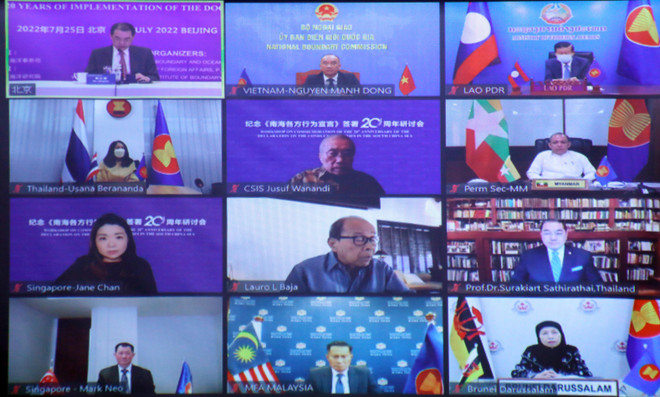 A virtual conference is held by the Chinese Ministry of Foreign Affairs on July 25 to mark the 20th anniversary of the Declaration of the Conduct of Parties in the East Sea (DOC). (Photo: the Vietnamese Ministry of Foreign Affairs)
A virtual conference is held by the Chinese Ministry of Foreign Affairs on July 25 to mark the 20th anniversary of the Declaration of the Conduct of Parties in the East Sea (DOC). (Photo: the Vietnamese Ministry of Foreign Affairs)Organised to mark the 20th anniversary of the DOC, the virtual event brought together incumbent and former Foreign Ministersof ASEAN member states, including those joining the signing of the document in2002, as well as a number of scholars from both sides.
Representatives from Vietnam also comprised Ambassador toChina Pham Sao Mai and Vice Chairman of the National Boundary Commission under the Ministry of Foreign Affairs NguyenManh Dong.
The event featured three sessions discussing the historic momentof the signing, the results and prospects for the DOC implementation, and theprogress and direction for consultations on a Code of Conduct in the East Sea (COC)between ASEAN and China.
In his remarks, Chinese State Councillor and ForeignMinister Wang Yi referred peace and stability in the East Sea as a prerequisitefor development in the region.
He proposed concerned parties continue maintainingpeace and cooperation at sea and promoting talks for the early finalisation of a practical and effective COC in line with international law, including the 1982 UN Conventionon the Law of the Sea (UNCLOS), to build the East Sea into a sea of peace, friendship and cooperation.
Nien emphasised the DOC was the first important documentsigned between ASEAN and a partner country. It reaffirms respect and commitmentof the parties to freedom of navigation and aviation in the East Sea and to peacefully settling disputes in accordance with international law, including the 1982UNCLOS, he said.
Incumbent FMs from ASEAN member states held that ASEAN andChina must continue fully implementing the DOC and provide an enablingenvironment for the talks on the COC; while their predecessors recalled the necessityof the DOC and the process towards its signing two decades ago and reiteratedits crucial role in maintaining regional peace, security, stability, cooperationand prosperity.
Delegates held that the results of COC negotiations have been fairly positive and substantive so far and that both sides must practiceself-restraint, avoid any actions that may complicate the situation, andrespect rights and interests of concerned parties in accordance withinternational law, particularly the 1982 UNCLOS./.



























